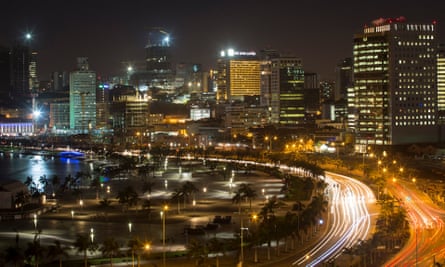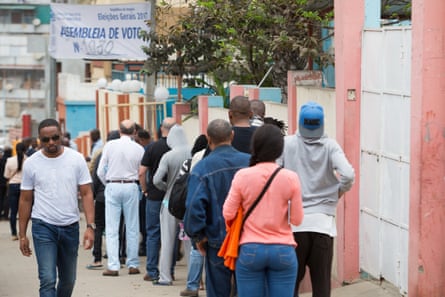The ruling party in Angola has claimed a widely expected election victory, setting the stage for a change of leadership after decades of authoritarian rule by the cold war veteran José Eduardo dos Santos.
Though final results from Wednesday’s voting were still being counted, the People’s Movement for the Liberation of Angola (MPLA) said it was on track to win a two-thirds parliamentary majority, based on its calculations.
In Angola, political parties are allowed to observe the elections by posting party members at every polling station and by assimilating results, the parties attempt to predict the election outcome.
Though the MPLA has yet to lose an electoral contest since a return to multiparty democracy 25 years ago, the real significance of the poll was that 74-year-old Dos Santos, who has ruled Angola for 38 years, did not stand as a presidential candidate.
His successor as president – should the MPLA projections be confirmed – will be João Lourenço, the 63-year-old defence minister and party veteran.
“We can affirm that the future president will be comrade João Manuel Gonçalves Lourenço,” João Martins, MPLA secretary for political and electoral affairs, said.
The main opposition, National Union for the Total Independence of Angola (Unita), disputed the MPLA’s projected result.
“Looking at the trend, the MPLA won’t have a majority at all,” Unita’s parliamentary head Adalberto Costa Júnior told Reuters news agency.

More than 9 million electors voted for a 220-seat parliament that would automatically select the candidate of the winning party as president. The MPLA won 72% in elections in 2012.
The decision of Dos Santos, Africa’s longest-serving president after Equatorial Guinea’s Teodoro Obiang Nguema Mbasogo, not to stand surprised many observers.
A series of leaders in southern and central Africa have employed a variety of strategies in recent years to hang on to power.
President Joseph Kabila in the Democratic Republic of the Congo says logistical obstacles prevent overdue elections from being held. Paul Kagame in Rwanda was re-elected this month for a new seven-year presidential term after changing the constitution. In Zimbabwe, Robert Mugabe, 93, has indicated he will stand again in elections next year.
Observers say Dos Santos, who is in poor health, will still exert significant influence as party leader and that his family’s grip on billions of dollars of businesses looks firmly established. His daughter, Isabel dos Santos, is thought to be Africa’s richest woman. His son, José Filomeno, is in charge of a $5bn state investment fund.
“Even if he wanted to, Lourenço may find it difficult to free himself from the Dos Santos. Large-scale political change is unlikely and long-awaited democratic reforms needed to turn around Angola’s struggling economy unlikely to materialise,” said Julia Westbury, Africa analyst at West Sands Advisory, a UK-based consultancy.
But Jensen Kirk Søren, of Chatham House in London, said it would be wrong to underestimate the departure of Dos Santos. “Lourenço is coming with a mandate. It’s not fair to say this is simply cosmetic,” he told the Guardian last week.
A deep economic crisis has hit the MPLA’s popularity in recent years. Inflation reached 40% in 2016, eroding living standards in a country where millions remaining mired in deep poverty despite the massive income generated by oil. Graft has also been a cause of discontent.

“There are no words to describe the level of corruption,” said former prime minister Marcolino Moco.
The MPLA, which has been in power since 1975, is still popular among many older voters. But with two-thirds of Angolans under 35, many were voting for the first time.
“We are voting for change,” said João Costa, 19, though he declined to specify for which party he had cast his ballot on Wednesday.
Lourenço joined the MPLA as a teenager and fought in the independence struggle against Portugal and the civil war with Unita that followed. The war, during which the MPLA (backed by Cuba and the Soviet Union) took on Unita (backed by the US and South Africa), devastated Angola. It ended in 2002.
Lourenço, who studied in the Soviet Union before rising up the ranks in the military and the party, navigated the MPLA’s swing from leftism to market capitalism with success. He has a reputation for relative probity and promised voters he would crack down on corruption.
There was widespread concern about the fairness of the electoral process. The government has deployed state resources on a huge scale and has consistently repressed critics, moving on 12 August to ban protests and demonstrations by groups not running in the polls.

A new law has given regulatory control of all media to a body administered by the government and the ruling party. Human Rights Watch said the election would be “marred by severe restrictions on freedom of expression and assembly”.
The European Union scrapped plans to observe the elections after Luanda failed to agree to a package of conditions, including access to all parts of the country during the poll. It sent a small team of experts instead.
André da Silva Neto, head of Angola’s election commission, said the poll was “an example of how elections should be carried out in any part of the world”.
An unofficial result is expected by Friday. However, there may be no formal announcement for two weeks as ballot boxes wend their way along potholed roads and dirt tracks in a country of 28 million spread across an area twice the size of France.
Moco has warned that change in Angola would be “slow and difficult”.
